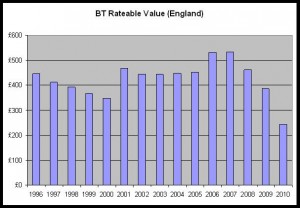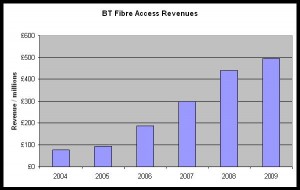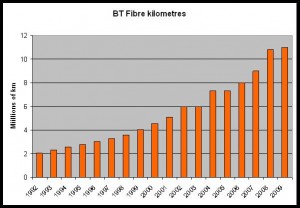The great and the good of the WiFi hotspot industry descended on London today to meet the Valuation Office Agency. On the agenda was the fact that the VOA wants to slap business rates on WiFi hotspots.
The law says that rates are applicable based on the perceived rental value of any WiFi hotspot that uses brackets to support an aerial, the cabling to that aerial, the cabinet that houses the WiFi equipment and the value of the land that the aerial is connected to.
This “land” could of course be a single brick 20 feet in the air, but there is gold in them there bricks!
The VOA is undergoing this exercise it seems a) because they are obliged to by law and b) if they don’t they are likely to be subjected to a judicial review at the request of mobile operators who are themselves charged rates for their masts and have a track record of crying foul to get a level playing field .
The bad news is that if they can get the work done before 31st March 2010 the VOA can back date the rates to 2005! This rolls on a year if they can finish the job by 31st March 2011 but if they miss the 2011 date they lose 5 years worth of rates which can then only be backdated a year. So there is pressure on them to get the job done.
Having stared blankly at a wall for two years the VOA has, in desperation, called in the operator community to find out how to go about it.
The meeting started very heatedly with the three surveyors from VOA being bombarded with angry/concerned questions from participant companies that included commercial organisations such as Timico (who of course made a calm and measured contribution to the discussion) , BT Openzone, The Cloud and SwissCom together with those whose role was somewhat more charitable, for example with the provision of wireless broadband access to rural communities.
The problem for the latter is that the VOA can’t differentiate between a service that is provided on a “for profit” basis and the charities. All they are concerned about is the rateable value. Even if a site is provided free of charge they still look around at what a free market rent might be to come up with the value. There is no “fairness” involved here.
Another problem is that no one at the VOA has a clue what the rental value of a WiFi hotspot aerial site is.
In the absence of any real information the VOA has drawn a line in the sand at £100, which at the current 46.6 pence in the pound being charged for business rates could amount to a significant total cost for many operators, especially if backdated. The £100 is a challenge for operators to provide them with real value information and is based on a sum agreed with Traffic Master for each of their cameras (after two years of heel dragging by TM).
The whole subject is hugely complicated. There are millions of hotspots out there with potentially many different rental scenarios for variable valuations. For example a lamppost in the City of London will be worth more than one in Carlisle (random place not in London).
There are 80 valuations offices in the UK and the team we met today will have the task of training inspectors in each of these offices to go out and value each hotspot. Once they have worked out how to do it themselves that is.
Many of the valuations are likely to be very low – £25 or less say. Where do you draw the line at which sites to go and value, remembering that a £25 RV would only be worth twelve quid a year on the rates.
At this point I could feel a slight sigh of relief amongst the operators – this looked like a very lengthy job. The VOA is, however, trying to find a shortcut.
There are some get out of jail free cards that only really came to the top of the deck towards the end of the meeting.
The four criteria being applied to the decision as to whether a hotspot is rateable are whether the site is beneficial, exclusive, active and not too transient. I’m not a lawyer and not about to expound on lengthy definitions for each word here but “exclusive” and “not too transient” will have helped many of us in the room.
If a hotspot is a normal wireless router, in a café or a hotel for example then it is considered that this router can be moved from one space on a counter to another. This means that it is transient and means that this hotspot is not rateable.
If a hotspot can be switched off by someone other than the operator, for example by the café owner switching it off at the wall before he goes home, then this also means that probably no rates will be payable.
So community networks operating as a “charitable” type of service should be able to get around having to pay rates just by making sure that the farmer/librarian/good neighbour hosting the particular hotspot has the ability to switch it off at the wall. Obviously this doesn’t point to 100% reliability but I suspect that this is the scenario actually seen in many community networks already.
As I said the VOA is in a hurry and there is therefore a danger that in rushing things they will get it wrong. Tune in to trefor.net for more information as it happens, hot off the wireless wire.
PS The meeting was billed as a Wireless Fidelity Conference – quaint huh? I’m not going to tell you what hereditament means – Google it 🙂




